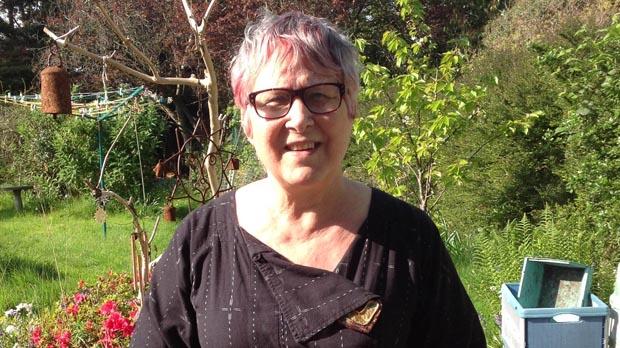
"I was delighted to take part in a clinical trial as it has the potential to really help others in the future.”
Please note - this trial is no longer recruiting patients. We hope to add results when they are available.
This trial is looking at 2 drugs called ruxolitinib (pronounced ruck-sol-it-in-ib) and BKM120 to treat myelofibrosis.
Myelofibrosis (pronounced my-eh-lo-fy-bro-sis) is a rare blood disorder. It is a condition that causes scarring of the  . A small number of people with myelofibrosis go on to develop acute myeloid leukaemia.
. A small number of people with myelofibrosis go on to develop acute myeloid leukaemia.
Myelofibrosis can develop without having had any other condition. This is called primary myelofibrosis (PMF). It can also develop in people who have polycythaemia vera or thrombocythaemia. This is called secondary myelofibrosis. This trial is for people with either primary or secondary myelofibrosis.
The trial is looking at a combination of 2 drugs called ruxolitinib (also known as INC424) and BKM120. They are both types of biological therapy.
Ruxolitinib is a cancer growth blocker. It stops signals that cancer cells use to divide and grow. Doctors can already use ruxolitinib to treat myelofibrosis.
BKM120 blocks a group of proteins called PI3K. Blocking PI3K proteins may also help to treat myelofibrosis. BKM120 is being looked at in trials for different types of cancer.
The main aims of the trial are to
You may be able to enter this trial if you
 that your doctor can feel when they examine you
that your doctor can feel when they examine youAs well as the above, if you’ve already had ruxolitinib or a similar drug (a JAK2 inhibitor), you can only take part if your spleen didn’t reduce in size by at least half or other symptoms didn’t improve. Or if the treatment did help you, the benefit has now been lost, for example you spleen is now getting bigger.
You cannot enter this trial if you
 that could affect how you absorb tablets or capsules
that could affect how you absorb tablets or capsulesThis phase 1 trial will recruit more than 60 people. Everybody taking part has both ruxolitinib and BKM120.
You take ruxolitinib tablets twice a day. You take BKM120 capsules once a day. The trial team will explain exactly how and when to take them.
The first patients taking part will have the lowest doses of both drugs. If they don’t have any serious side effects, the next few patients will have a higher dose of one drug and then the next few will have a higher dose of the other. And so on, until they find the best doses of both drugs to give together. This is called a dose escalation study.
When the researchers have found the highest safe doses, the rest of the people joining the trial will have these doses of the drugs.
As long as you don’t have bad side effects, you have treatment for 24 weeks (nearly 6 months). The trial team will then check to see whether the treatment is helping you. If it is, you can have another 24 weeks of treatment.
The trial team will ask you to fill out a questionnaire before you start treatment, every 4 weeks during treatment and when you finish treatment. The questionnaire will ask about side effects and how you’ve been feeling. This is called a quality of life study. They will also ask you to fill in some questionnaires that ask about your mood and whether you feel depressed.
You see the trial team and have some tests before you start treatment. The tests include
 )
) or
or  )
)Depending on when you join the trial, you may also have a CT scan or MRI scan.
You go to hospital at least 9 times in the first 4 weeks of treatment, 4 times in the next 4 weeks and then once every 4 weeks after that.
You have regular blood tests and ECGs. You have another bone marrow test after about 6 months of treatment. Depending on when you join the trial, you may have 2 more CT or MRI scans during treatment.
When you finish treatment, you see the trial team again a month later. You have a physical examination, blood tests and an ECG. You have another bone marrow test if it is more than 6 weeks since you had one. You may also have a CT or MRI scan.
Having ruxolitinib and BKM120 together is a new drug combination and there may be side effects we don’t know about yet.
The possible side effects of ruxolitinib include


There are some risks associated with stopping ruxolitinib suddenly. These include feeling anxious, difficulty sleeping and weakness. Also, symptoms of myelofibrosis may come back.
If you need to stop taking ruxolitinib, your doctors will reduce the dose gradually if possible. They may give you  to reduce the withdrawal effects.
to reduce the withdrawal effects.
In other trials, the most common side effects of BKM120 have been
Please note: In order to join a trial you will need to discuss it with your doctor, unless otherwise specified.
Claire Harrison
Experimental Cancer Medicine Centre (ECMC)
Novartis
If you have questions about the trial please contact our cancer information nurses
Freephone 0808 800 4040

"I was delighted to take part in a clinical trial as it has the potential to really help others in the future.”